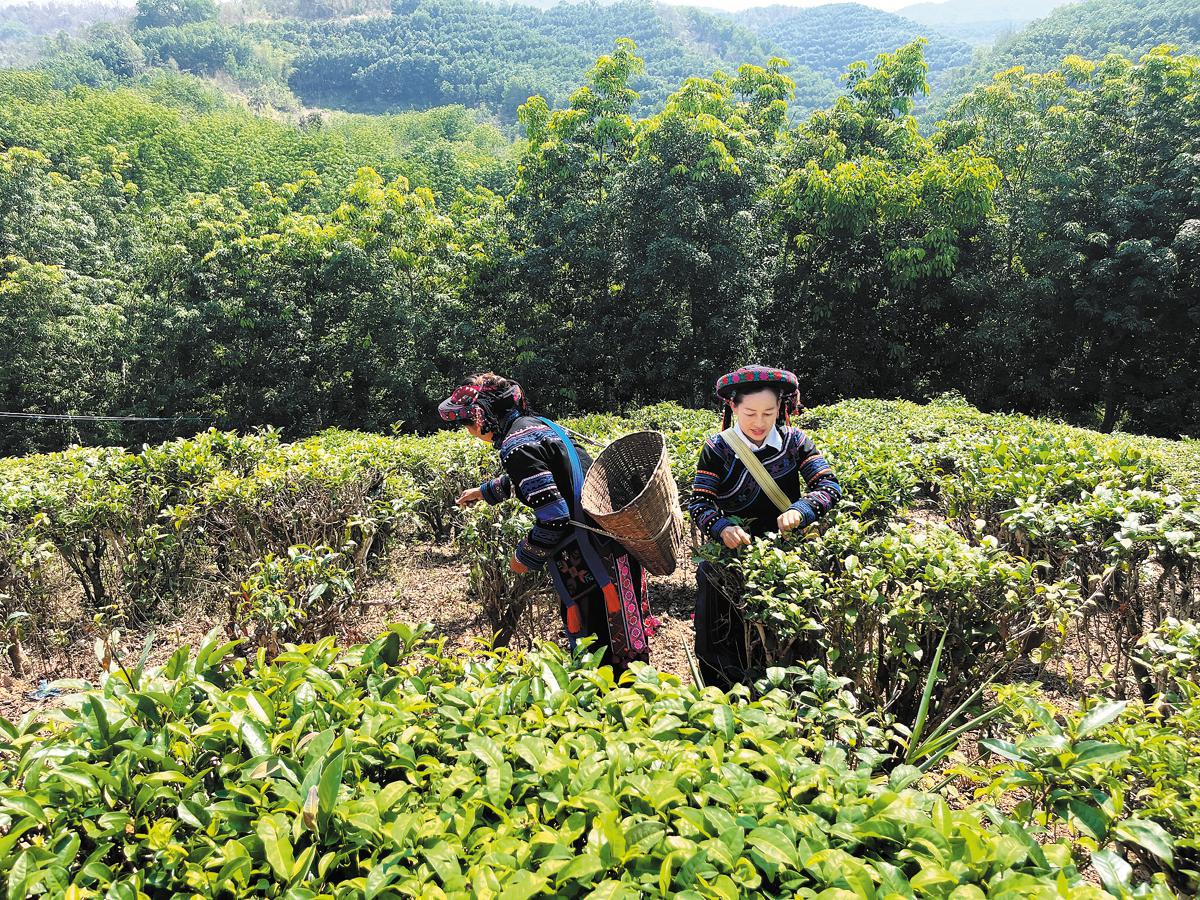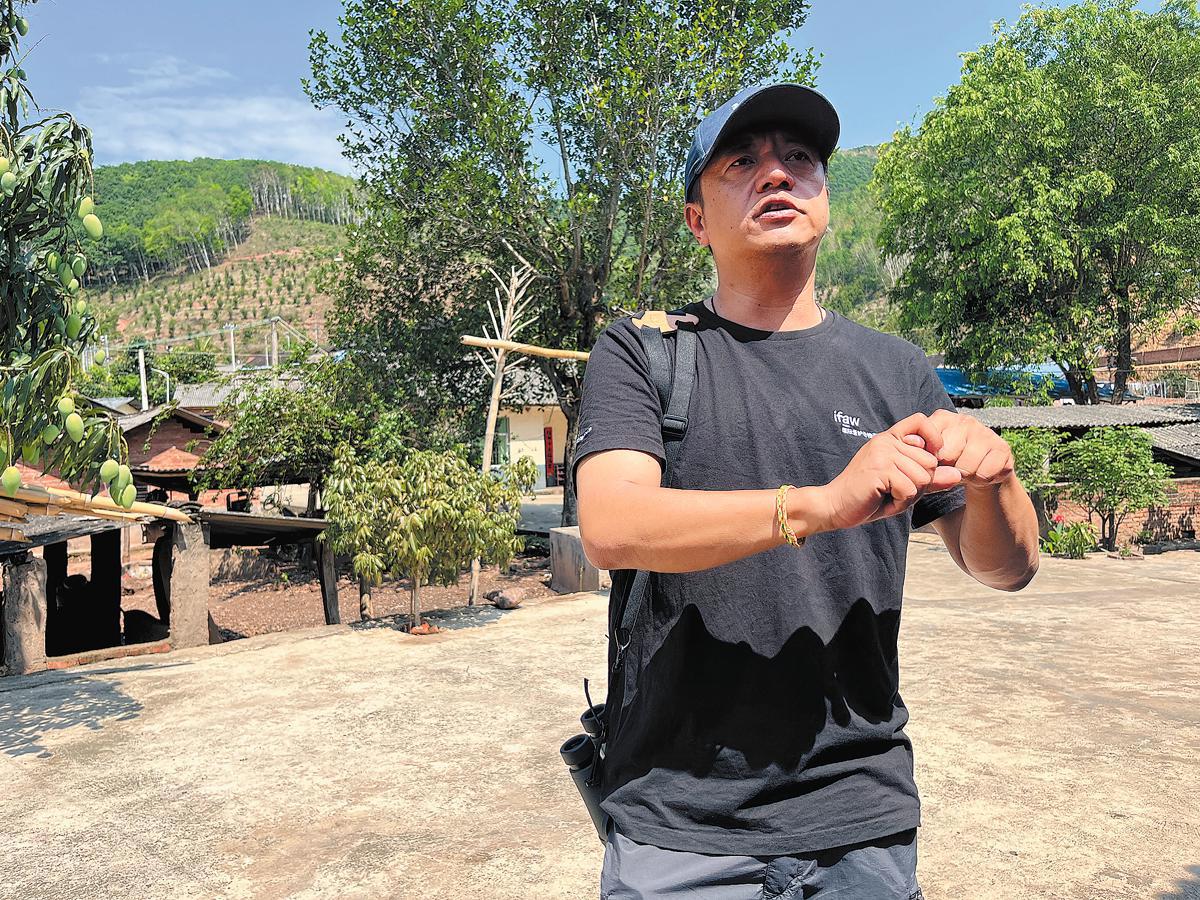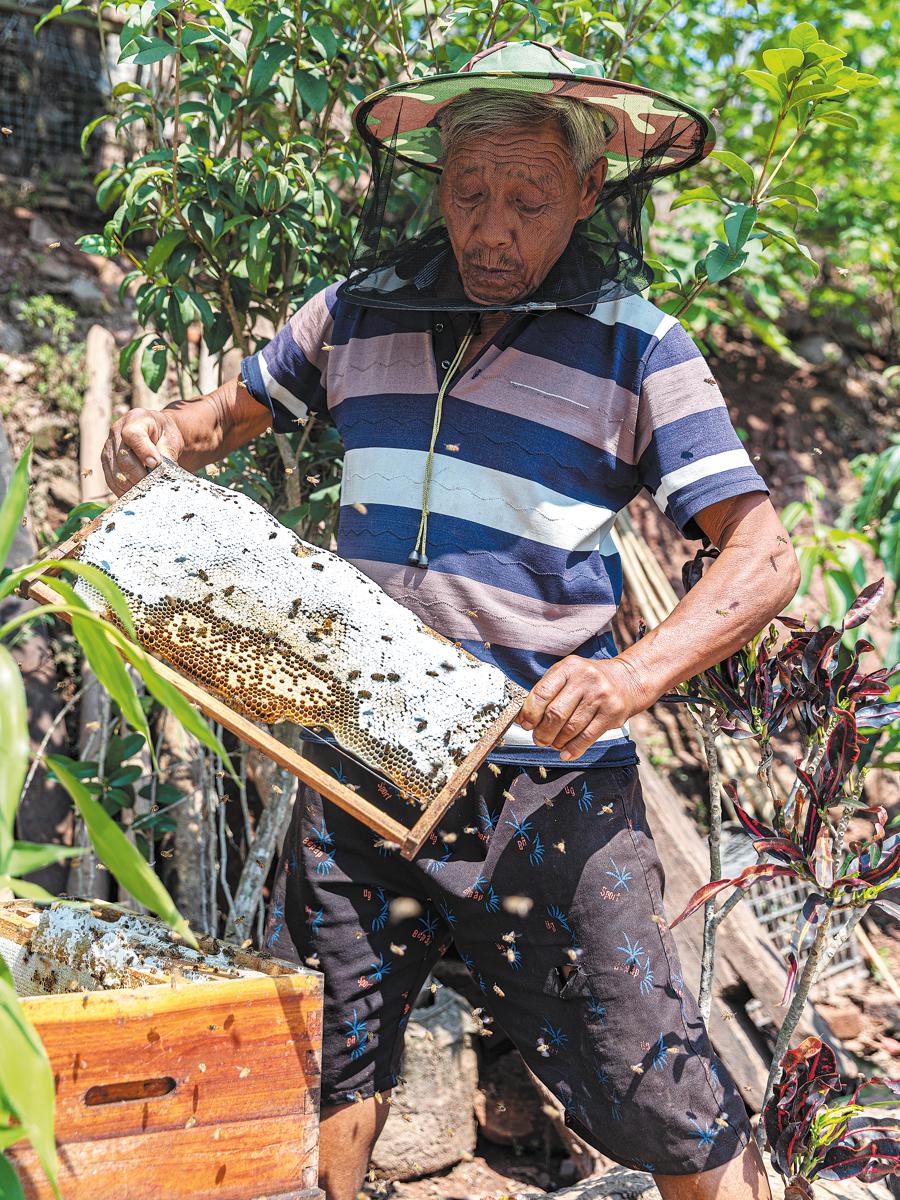Rural communities in Yunnan province shown alternative ways to live off the land
 |
| Villagers harvest tea leaves in the Konggeliudui community in Jinghong, Yunnan Province. [Chen Liang/China Daily] |
Most of the country's wild Asian elephants, more than 280 individuals, are distributed in Xishuangbanna Dai Autonomous Prefecture in the southernmost part of Yunnan Province.
Attracted by the abundance of food such as corn and bananas, and growing accustomed to a human presence, these majestic animals often venture into areas inhabited by people.
The increasing proximity between humans and elephants has led to a rise in conflicts, presenting challenges for many communities that previously had little to no experience with elephant activities.
To address the conflicts, local governments and conservation organizations have implemented various strategies.
In Xishuangbanna, both the governments of Jinghong City and Mengla County have established the Asian Elephant Safety Warning Monitoring Team.
Teams of professional "elephant watchers" use drones to continuously monitor the movements of wild elephants, providing crucial information to local communities and residents.
By offering timely updates on the whereabouts of elephants, the aim is to minimize the risks associated with human-elephant encounters.
Since the launch of its Asian Elephant Protection Program in 2000, the International Fund for Animal Welfare China has focused its efforts toward helping local communities and residents, said Ma Chenyue, program manager of IFAW China.
"Local communities and people are at the forefront of human-elephant conflicts. They are experiencing direct pressures from the expansion of wild elephants into their living spaces," Ma said.
"Their crops are destroyed; their safety is jeopardized while tending to rubber plantations or foraging for mushrooms in the forests; and they actually have made sacrifices in their economic development for the conservation of wild elephants. "So we feel obliged to aid them in finding sustainable ways to live harmoniously alongside wild elephants."
 |
| Cao Dafan visits Daotangqing Village in Jinghong. [Chen Liang/China Daily] |
Beekeeping
In June 2020, IFAW China, in collaboration with the Mengyang Protection Station of Xishuangbanna National Nature Reserve and the Rainforest Foundation of Xishuangbanna, a local nonprofit, the "Community Livelihood Development to Promote Asian Elephant Protection" project was launched in Daotangqing Village, Mengyang Township, Jinghong.
This community, comprising 34 households and 150 residents of the Yi ethnic group, had relocated from the core area of the national nature reserve in the late 1990s to aid in the conservation of Asian elephants, a species under national first-class protection, said Cao Dafan, program officer of the AEP program.
Following their relocation, however, wild elephants also ventured into the area surrounding the village. Once in 2022, Cao said, the villagers witnessed a visit of a herd of 22 wild elephants.
On May 10, Zhang Jiangmei, a villager, said that an elephant visited a stream near the hamlet in the evening to have a drink and a bath.
Cao said that the primary source of income for villagers is derived from cultivating rubber trees. However, due to a decline in rubber prices over the past few years, their incomes have also experienced a notable decrease.
"So we worked to help the community explore some alternative sources of income to reduce their dependency on rubber trees," he said.
At first, Cao and his colleagues decided to promote beekeeping in the village. "Beekeeping is eco-friendly, good for crop cultivation and easy for villagers to learn and master," he said.
In 2020, the project invested 75,000 yuan ($10,600) to acquire 100 hives of the Chinese bee and an additional 100 empty beehives and distributed them to 10 families in the Daotangqing Village.
In addition to providing training on beekeeping techniques, Cao and his team also helped the beekeepers establish management rules.
One of these rules includes prohibiting the introduction of wild swarms of bees into the hives, Cao said. It helps maintain the health and productivity of the bee colonies, he explained.
Between 2020 and last year, he said, beekeeping generated an income of about 200,000 yuan for the participants in the project.
However, there was an unexpected setback.
Between September and October last year, the bee population in Daotangqing experienced a significant drop, with half of the bees perishing, Cao said. The villagers soon found the cause — a species of hornet that was being cultivated in a nearby village attacked the Chinese bees at Daotangqing, feeding on their pupa.
"In Xishuangbanna, hornet pupa is considered a delicacy," Cao said. "So some people have cultivated the aggressive species to meet the market demand."
After negotiations between the two communities, the hornet cultivators agreed to cease their practice. Because of the incident, Cao said, the population of the bees at Daotangqing needs some time to restore.
 |
| A villager harvests honey at Daotangqing. [Chen Liang/China Daily] |
Cash Crops and Solar
Besides beekeeping, the international NGO also introduced the cultivation of cash crops such as mangos and macadamia nuts to the villagers.
In 2021, Cao said villagers cleared more than 15 hectares of rubber trees surrounding the village because of the plummeting price of rubber.
"So we took the chance to recommend planting mango and macadamia nut trees to them," Cao said.
Cao and his team members invited agricultural experts from the Yunnan Institute of Tropical Crops in Jinghong to Daotangqing and trained villagers on how to manage their orchards.
Nineteen families participated in the project, he said, employing sustainable management practices to reduce pesticide and fertilizer usage, lower management costs and increase ground cover vegetation. "The experts told us that the undergrowth in their orchards can be good for the growth of fruit trees, and they also showed us how to accurately use pesticide and fertilizer," Zhang said.
Through eco-friendly management and planting practices, the project is estimated to be able to achieve a reduction of 971 to 1,256 metric tons of carbon dioxide over 15 years, with an annual reduction of 65 to 84 tons, according to Cao.
"Mango cultivation started to yield profits for the villagers last year, and the nuts will start generating profits this year," he said.
"In the long term, we hope that rubber plantations can be replaced with ecologically friendly, carbon-efficient crops, and the overall quality of the local ecosystem can be enhanced."
Moreover, IFAW China provided assistance to a family of six by installing a 16-kilowatt photovoltaic panel system in their courtyard. "In 2021, we aimed to initiate a pilot project to enhance the utilization of clean energy in the local residents' daily lives," Cao said.
Following a field survey, they identified that the 130-square-meter courtyard of villager Wang Baozhong and his family was sufficient for installing a system comprising 30 photovoltaic panels.
Wang, who has been a patrolman for the nature reserve for many years, was happy to try something new.
So Cao's project allocated 80,000 yuan for the construction of the system in July 2021, which started generating electricity in April 2022. Once the system fulfilled the family's daily electricity needs, any surplus electricity can be transferred back into the local grid.
From April 2022 to November last year, the photovoltaic system produced a revenue of more than 8,000 yuan, Cao said.
"The family kept half of the revenue, and the other half was given to the village for community development," he said.
Community Care
In December, IFAW China, the protection station and the rainforest foundation expanded their project to the Konggeliudui community in Dadugang township, Jinghong.
The community is predominantly inhabited by the Hani ethnic group, with 39 households. More than 60 wild Asian elephants roam in the vicinity.
The community's primary livelihood revolves around rubber tapping and tea cultivation. "During the harvest season, villagers' chances of encountering elephants in the forest increases," Cao said.
"So our project is set to combine beekeeping with empowering residents, enhancing their skills and income while reducing their forest activities to minimize human-elephant conflicts."
During the project's inauguration in December, the first 100 beehives were distributed to 10 households in the community.
After some field research, the conservationists also found that traditional embroidery practiced by a few senior residents, including an inheritor of the intangible culture heritage, has the potential to become a new source of income for villagers and cater to visitors as Konggeliudui is close to the Wild Elephant Valley scenic area, a major tourist attraction in Xishuangbanna.
The local government has already helped build an embroidery workshop in the community, said Yang Yan, head of the village. "In our spare time, we can learn with our inheritor to make traditional costumes featuring the embroidery," she said.
It takes her more than a month to make a traditional costume, she said, adding that villagers can sell their costumes to visitors.
Cao and his colleagues are helping the community plan for rural tourism development by training community tour guides.
In April last year, IFAW China collaborated with Freshippo, also known as Hema, a direct warehouse shopping and grocery chain, to market honey from Daotangqing and another community in Xishuangbanna under a brand named Zero-Carbon Elephant-Friendly Honey.
The first carbon-zero honey in the country, with a limited run of 3,000 jars, was sold in Freshippo stores in Beijing, Shanghai and Hangzhou in Zhejiang province.
The profits from the sales were subsidized to support the sustainable development of the beekeeping project, said Ma from IFAW China.
"The focus of all of our community projects has been to broaden local people's vision and empower them with new skills," she said.
(Source: China Daily)
Editor: Wang Shasha